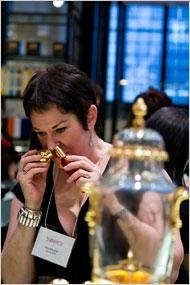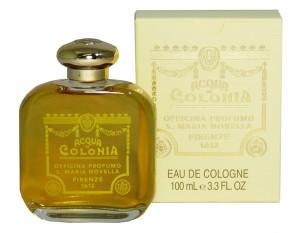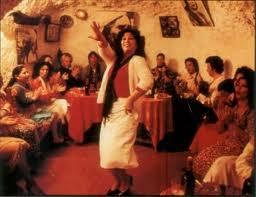Ah, the complex and ticklish nature of Spanish Leather.
I am inordinately fond of the aromatically challenging substance.
This is a given; I’m so curious that it has caused me much chagrin in my life, but I refuse to cease and desist from sniffing and snorting all sorts of scents…
One could add that- in my thinly-veiled beneficence-
I smell them, so you don’t have to .
Enter Santa Maria Novella’s Peau d’Espagne.
She’s a real stinker.
This I profess with ardent admiration.
The tanning process has always been a foul-smelling affair, needless to say.
In the 16th century, flower, herbal, and spice essences were employed to ameliorate the nasty residual stench.
The mélange that was produced then, appears equally timeless and fresh today.
But it is not a parfum for the timorous.
It makes your knees knock and your heart race.
Some are frankly repulsed by it.
Apparently, the original formula consisted of rose, neroli, bergamot, verbena, lavender, clove, and cinnamon.
The real kicker was the addition of musk and civet.
As if the animalic nature of newly tanned leather didn’t suffice, on its own merits!
This was intended to improve the garment’s odor- be it saddle, boots, gloves, etc.
The 20th century saw fit to add the softer notes of styrax, tonka bean [both sweet and tobacco-like, with a hay nuance], geranium [punching up the verbena/ neroli], and vanilla.
This may have rendered Peau d’Espagne a modicum more suitable for ladies,
But not by much.
Why so critical?
Actually, I’m not – I’m merely being matter-of-fact.
In today’s society, where wispy minimalist compositions abound and are highly prized for their inoffensiveness, Peau d’Espagne still retains the capacity to shock.
The further we get from our origins of hunter/ gatherer and agricultural economy, the less comfortable we are with the aromas that were part and parcel of such an existence.
It may feel alien or other.
Or it may stir the collective unconscious.
For me [and I own the Estratto Triplo- the triple extract, big guns] it begins as a smoky, potent birch beer with a whip.
It feels pleasurably odd, somewhat dissonant.
There is an intoxicating hay-like, dark harsh tobacco feel, with a civetty growl.
So well-blended, you have to stretch to smell the lavender you know is in there.
Neroli you can discern; it would take a far more sensitive nose than mine to suss out the floralcy here.
Spice, yes. Flowers- less so.
When all calms down, there is an intriguing campfire smokiness I enjoy very much.
A gypsy caravan awaits…
Peau d’Espagne is for my private delectation alone.
I’ll be damned if I’ll wear it to work, or your average social situations.
No need to frighten women, children, and the horses, is there?
Photo credits:
Vintage corseted lady with whip: strategicillegibility.blogspot.com
Cordoba : pergamena.net
Spanish riding boots :greatenglish.co.uk
Ida snorting at Bendel's: c/o NYT
SMN Peau d'Espagne image: perfumaniya.com.ua
Revulsion: clericalwhispers.blogspot.comSpanish gypsies:doslunares.org
Bullwhip: knifecenter.com
Boylan's Birch Beer: chowbellablog.wordpress.com
Gypsy Caravan: crazy4me.com
Gypsy horse: horse-legacyvanners.net
–Ida Meister, Senior Editor









